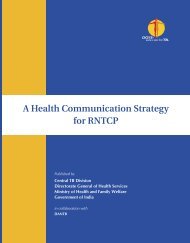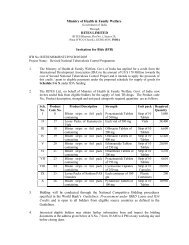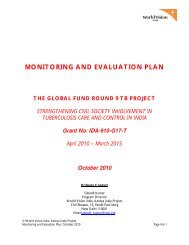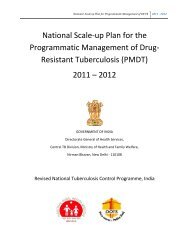RNTCP Annual Report 2012 - TBC India
RNTCP Annual Report 2012 - TBC India
RNTCP Annual Report 2012 - TBC India
You also want an ePaper? Increase the reach of your titles
YUMPU automatically turns print PDFs into web optimized ePapers that Google loves.
Decentralized procurement:<br />
As part of strengthening decentralized procurement, states<br />
have been repeatedly communicated to follow World<br />
Bank procurement guidelines strictly and the revised<br />
threshold limits for state/district level procurement of<br />
Goods / Works have been communicated to them. States<br />
are sending information about state/ district level procurement<br />
through "Procurement <strong>Report</strong>ing Format" circulated<br />
to them earlier by CTD, at the end of every quarter<br />
through the email ID i.e. distprocurement@rntcp.org.<br />
Capacity building for Decentralized Procurement :-<br />
The Bi-annual National STO-<strong>RNTCP</strong> Consultants Review<br />
Meet was held at Surajkund, Faridabad, Haryana in<br />
May, 2011 and at Dwarka, Delhi in November 2011.<br />
The May Review Meet had a session on "Decentralized<br />
Procurement in TB II" which was conducted by the Chief<br />
Medical Officer dealing with <strong>RNTCP</strong> Procurements in<br />
CTD. During this Meet, a session on the Roles and Responsibilities<br />
of the STOs and the Medical Consultants<br />
in drug management was also highlighted. All the participants<br />
were also apprised of the general bottlenecks in<br />
this area. During the November Review Meet, the topic<br />
of procurement and supply chain were covered through<br />
a quiz which generated a very good response.<br />
During the year 2010, trainings on "Decentralized Procurement<br />
in TB II" were also conducted for State level<br />
officials in Punjab, Chandigarh, Maharashtra, Tamil Nadu<br />
by concerned officials from Central TB Division. Training<br />
on "Decentralized Procurement in TB II" was also<br />
conducted by Consultant (Procurement), CTD for the<br />
Accountants of all the States in February, 2010 at New<br />
Delhi.<br />
Post Procurement Reviews:-<br />
Four Post Procurement Reviews of the Contracts in the<br />
States have been undertaken by CTD. Based on the reports<br />
of the Post Reviews, follow-up corrective actions<br />
are being taken by the concerned States. Post Procurement<br />
Review of State/ District level procurements are<br />
also being done during Central Internal Evaluation, <strong>Annual</strong><br />
Financial Audit and visit to the States by officials<br />
from Central TB Division.<br />
Procurement Management Information System<br />
(ProMIS) Software:-<br />
The web based software (ProMIS) to streamline procurement<br />
systems, developed by Empowered Procurement<br />
Wing (EPW) of the MOHFW has addressed all<br />
the key components of International best practices in<br />
procurement and logistics. The various modules of the<br />
<strong>RNTCP</strong>: Implementation status and activities in 2011<br />
29<br />
software include Forecasting, Planning, Bid Processing,<br />
Bid Evaluation, Supply Orders, Quality Assurance, Stocks,<br />
Inter warehouse transfers, Bills & Invoices etc. Live data<br />
entry by <strong>RNTCP</strong> for the procurement details of 1st line<br />
and 2nd line anti TB drugs for the year 2010-11 has been<br />
completed.<br />
Drug Logistics Management:<br />
Drug requirements, consumption and stock positions,<br />
both at State and district levels are monitored at the Central<br />
TB Division (CTD) through the Quarterly <strong>Report</strong>s<br />
submitted by the districts. The 1st Line Anti-TB Drugs<br />
procured are stored at the six Government Medical Store<br />
Depots (GMSDs) across the country and issued to the<br />
States based on the Quarterly District Programme Management<br />
<strong>Report</strong>s and the monthly State Drug Stores<br />
(SDS) <strong>Report</strong>s. The States are required to maintain defined<br />
buffer stocks at each levels i.e., at the PHIs, TUs,<br />
DTCs & the SDS. The District Quarterly <strong>Report</strong>s are<br />
analyzed in detail at CTD and any discrepancies arising<br />
are notified to the concerned districts & States for necessary<br />
corrections.<br />
For long-term sustainability of the programme, decentralization<br />
of inventory management practices is very<br />
important. To ensure that the States are able to manage<br />
their drug logistics as per <strong>RNTCP</strong> guidelines, regular<br />
trainings & re-trainings on Drug Logistics Management<br />
were conducted by Central TB Division for the State &<br />
district level staff during the year. These trainings were<br />
imparted to State level officials, District TB Officers<br />
(DTOs), State and District level pharmacists alongwith<br />
respective <strong>RNTCP</strong> Medical Consultants. Such trainings<br />
were conducted for the officials in Uttar Pradesh,<br />
Meghalaya, Mizoram, Manipur, Nagaland, Himachal<br />
Pradesh, Chhattisgarh, Bihar, Assam, Arunachal Pradesh,<br />
Sikkim and Tripura. About 350 <strong>RNTCP</strong> officials/ Consultants<br />
have been trained during the year on Drug Logistics<br />
Management. The DTOs are expected to further<br />
train their sub-district level staff involved in drug logistics<br />
in their respective districts.<br />
Suggested- place for insertion of 2-3 photos on<br />
Drug Stores and Drug Logistics Training<br />
To study the impact of such trainings, CTD is also regularly<br />
re-visiting and doing field visits to some of the States<br />
already trained. Gujarat, Jharkhand, Andhra Pradesh,<br />
Uttar Pradesh, Meghalaya, Chhattisgarh and Assam were<br />
visited during the year by teams from CTD. Some improvements<br />
have been noticed but the lack of commitment<br />
by concerned officials at State and District levels is<br />
still seen as a major drawback. Some of the common<br />
observations noticed are:-






